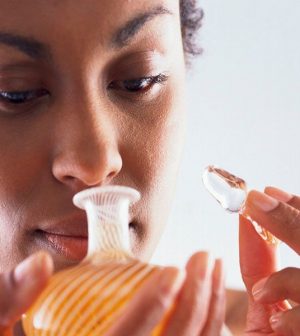- Recognizing the Signs of Hypothyroidism
- 10 Strategies to Overcome Insomnia
- Could Artificial Sweeteners Be Aging the Brain Faster?
- Techniques for Soothing Your Nervous System
- Does the Water in Your House Smell Funny? Here’s Why
- Can a Daily Dose of Apple Cider Vinegar Actually Aid Weight Loss?
- 6 Health Beverages That Can Actually Spike Your Blood Sugar
- Treatment Options for Social Anxiety Disorder
- Understanding the Connection Between Anxiety and Depression
- How Daily Prunes Can Influence Cholesterol and Inflammation
COVID-Linked Loss of Smell, Taste Can Linger for Many Months

By now, most folks know that a loss of smell and taste are a hallmark of COVID-19 infection, but new research shows it can continue up to five months after the virus first strikes.
“It was apparent from the beginning of the pandemic that a significant percentage of people lost their capacity to smell,” said researcher Dr. Nicolas Dupre, director of neuromuscular and neurogenetic disease clinic at Laval University in Quebec. “This is quite common in many infectious diseases, but in COVID, the effect was much more important.”
In other viruses, smell and taste usually return after the sinuses are clear. But in COVID-19, the virus might penetrate the small area of the brain called the olfactory bulb, which is important for the recognition of smell, Dupre explained.
“The virus probably kills some of the cells in the olfactory bulb, and that’s why you have a long-lasting effect,” he said.
Losing your sense of smell can affect your daily life, Dupre said. And even when it returns, it can be different from before the virus, he said. In some people, the loss of smell might be permanent, but that’s not clear yet.
“We still think that in 80% of the people there’s not as a significant impact on their smell. So, most people will recover, but in a small percentage, it may be permanent, so this could be part of the long-term disability that we see in COVID,” Dupre said.
For the study, his team collected data on more than 800 health care workers who had COVID-19. The participants completed an online survey and home test to evaluate their sense of taste and smell about five months after diagnosis.
In all, 580 people lost their sense of smell, and 297 of them (51%) said they had not regained their sense of smell five months later. A home test found that 17% had persistent loss of smell.
Also, 527 participants lost their sense of taste during the initial illness. Of these, 38% said they had not regained their sense of taste five months later, and 9% had persistent loss of taste when evaluated with the home test, the researchers found.
“This is part of what we call long COVID,” said Dr. Thomas Gut, director of the COVID recovery program at Staten Island University Hospital in New York City.
Long COVID is typically categorized by fatigue, brain fog or memory issues and loss of smell, said Gut, who wasn’t involved with the study.
“Even though the virus is long gone, even though people have recovered from the respiratory part of the virus, about 20% still have these complaints,” he said.
Long COVID affects daily living and there’s little that can be done, Gut said.
“We have a lot of people who can’t go back to work, can’t go back to their level of exercise and functioning as they could before the virus. And we still don’t have any clear answers as to how to treat these patients,” he said.
Gut said the best way to prevent these problems is not to get sick in the first place. And the best way to do that is to get vaccinated, he said.
The findings were released Feb. 22 for the online meeting of the American Academy of Neurology, to be held April 17-22. Such research is considered preliminary until published in a peer-reviewed journal.
More information
For more on COVID-19, see the U.S. Centers for Disease Control and Prevention.
SOURCES: Nicolas Dupre, MD, director, neuromuscular and neurogenetic disease clinic, Laval University, Quebec, Canada; Thomas Gut, DO, associate chair, medicine, and director, COVID recovery program, Staten Island University Hospital, New York City; American Academy of Neurology, online annual meeting, April 17-22, 2021
Source: HealthDay
Copyright © 2026 HealthDay. All rights reserved.










